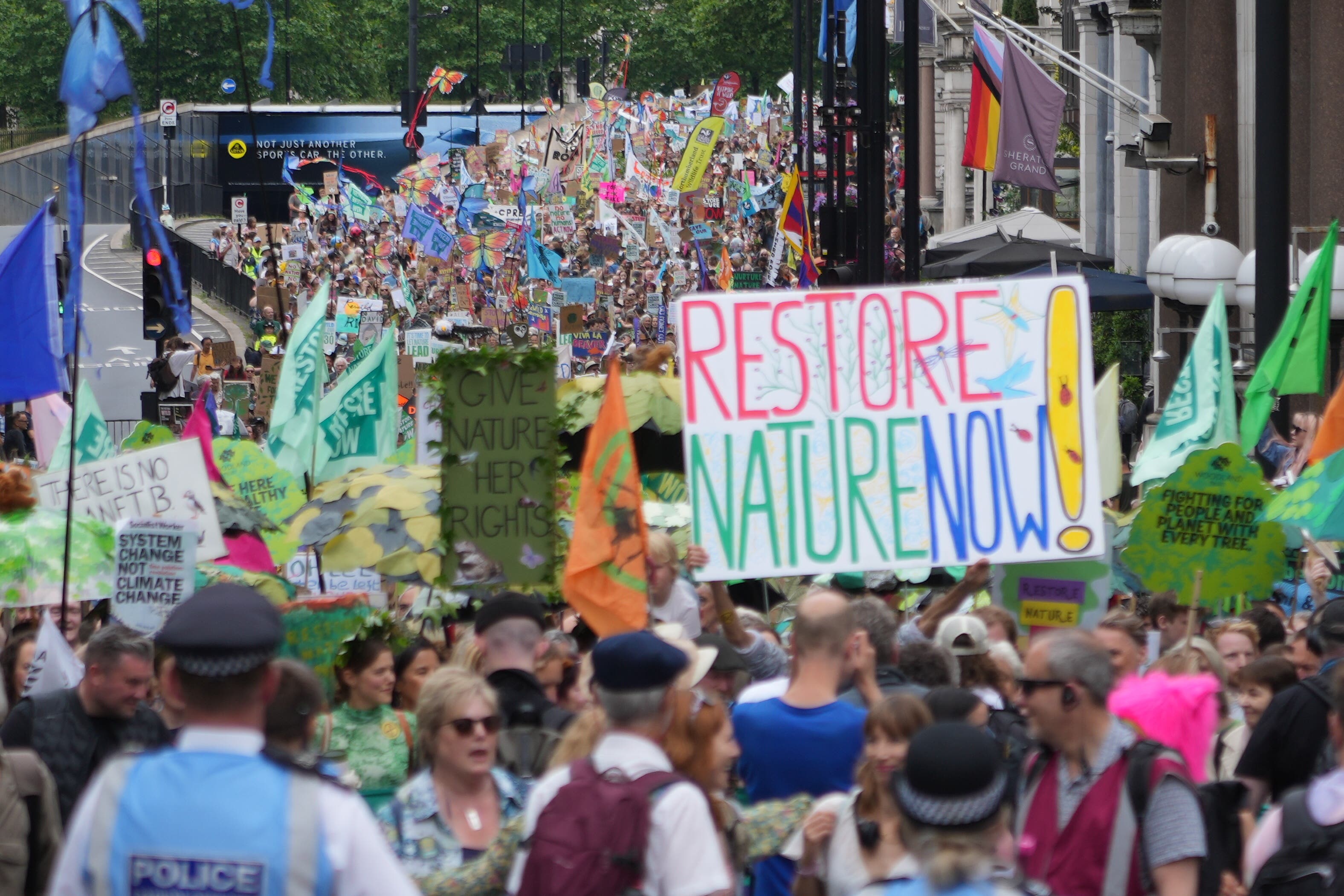Countries gather for UN biodiversity summit to negotiate halting nature crisis
Countries are gathering to negotiate on how to halt and reverse the global declines in nature for the UN biodiversity summit Cop16 in Colombia.

Countries are gathering in Colombia for negotiations over halting and reversing the global declines in nature.
The UK Government named nature policy expert Ruth Davis as Britain’s first “Special Representative for Nature” on Monday as the two-week UN biodiversity summit, Cop16, kicks off in the city of Cali.
It comes as Labour seeks to reposition Britain at the centre of global climate and nature diplomacy, marking a contrast from the previous Conservative government, which rowed back on green policies and axed the climate envoy position.
Cop16 will focus on delivery as the first “Nature Cop” since the adoption of the landmark Kunming-Montreal Global Biodiversity Framework (GBF) at Cop15 in 2022.
The framework set out a pathway to a world that lives in harmony with the natural world by 2050 through dozens of targets like the “30 by 30” goal for governments to designate 30% of Earth’s land and ocean area as protected areas by 2030.
While the collapse of nature may be the less well-known sister problem to the climate crisis, the figures showing what people are doing to the planet are no less stark.
Scientists have warned that the natural world is deteriorating faster than ever as a direct result of human activity, including the clearing of forests and other habitats for crops and livestock, pollution, direct exploitation of wildlife, invasive species and increasingly climate change.
As part of the 2022 agreement, countries agreed to submit updated versions of their individual plans to tackle nature loss – known as National Biodiversity Strategies and Action Plans (NBSAPs) “by” Cop16.
Of the almost 200 countries in the treaty, a UK official said just 21 updated NBSAPs have been tabled ahead of the conference, with another 20 expected to be delivered as it starts.
For a summit focused on delivery, the low number has sparked concerns about a widespread lack of urgency on nature loss and what it could mean for the negotiations.
Delays come down to the need for lengthy stakeholder consultations in individual countries as well as elections taking place across the world in 2024.
Britain is among those to have missed the deadline due to the general election, while the UK’s NBSAP is tied up with its Environmental Improvement Plan (EIP), which the new Government is currently reviewing.
Instead, the UK provided the UN with a technical document, known as a national target submission, by the deadline in August this year.
A UK official said: “What we’ve done is indicate to the globe that we’ll meet all the goals and targets of the (GBF).
“We will meet all of those domestically and we submitted those goals and targets … by the international deadline.”
The official also praised Colombia’s Environment Minister, Susana Muhamad, as “a triumph for nature diplomacy” who is “going to run a brilliant Cop”.
“This is kind of one of the first big international meetings that we’re returning to with a real sense of optimism, a real sense of UK back at the centre of international leadership,” they added.
Other topics up for discussion include the further development of a framework to monitor global efforts on nature.
And, again, countries will be negotiating the issue of money – who will pay for restoring the world’s nature and how much.
There are also expectations for a major agreement on the fair and equitable sharing of benefits from digital sequence information (DSI) on genetic material in nature, with the UK co-chairing those discussions.
Beyond the official negotiations, the summit will involve swathes of events and projects, covering topics like biodiversity credits, nature finance tracking, natural capital, indigenous rights and environmental crime.
Craig Bennett, chief executive of The Wildlife Trusts, said the organisation is calling for the UK to step up its own actions on nature and get efforts back on track to meet its 30 by 30 target.
He said: “It’s vital that the UK gets stuck into reducing river pollution, protecting more land for nature and halving the use of pesticides, to name a few – otherwise this country will fail its targets and completely undermine the international agreement.
“There’s a colossal job to do in the next five years and we urgently need to see a radical approach to rebuilding our natural infrastructure fast.”
And WWF UK chief executive Tanya Steele said the UK needs to deliver action such as removing deforesting products from its supply chain.
The group’s recent Living Planet report found that global wildlife populations have declined by an average 73% on average since 1970 and the Amazon is reaching an irreversible tipping point.
“The next five years will determine the health, the stability and the future prosperity of humanity on earth,” Ms Steele said.
“We are certainly encouraged by what we have heard on nature from the new Government. But, as this report underlines, we need to see action, and we need to see it quickly.”
More widely, Greenpeace is calling on governments to pay up on the 20 billion US dollars (£15.3 billion) promised by 2025 to fund global biodiversity protection, and enable direct finance for indigenous peoples and local communities.
It also wants to see a plan to link climate and biodiversity action, increased ambition in terms of delivery and NBSAPs, and an agreement on how to amend the network of ecologically or biologically significant marine areas.
Bookmark popover
Removed from bookmarks